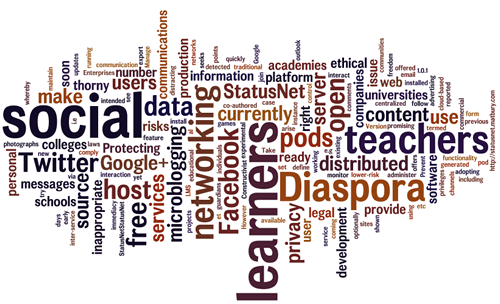 In a previous post that I co-authored with Jeff Dionne, A thorny issue: Protecting teachers’ and learners’ right to privacy, we highlighted some of the ethical and legal risks of using popular commercial social networking and micro blogging sites such as Facebook, Google+ and Twitter for educational purposes. Although modern LMS’ built on Social Constructivist approaches provide a number of tools for collaboration and social interaction, they don’t quite offer the persistence and immediacy of the services offered by Facebook, Google, Twitter, et al. So as a follow up to that article, here’s some secure, free and open source alternatives.
In a previous post that I co-authored with Jeff Dionne, A thorny issue: Protecting teachers’ and learners’ right to privacy, we highlighted some of the ethical and legal risks of using popular commercial social networking and micro blogging sites such as Facebook, Google+ and Twitter for educational purposes. Although modern LMS’ built on Social Constructivist approaches provide a number of tools for collaboration and social interaction, they don’t quite offer the persistence and immediacy of the services offered by Facebook, Google, Twitter, et al. So as a follow up to that article, here’s some secure, free and open source alternatives.
What are the criteria that make a social networking platform lower-risk?
For details about what some of the risks are, please see A thorny issue: Protecting teachers’ and learners’ right to privacy. Here’s a few points that make a social networking platform more ethical and legal for your learners to use:
- Own and administer your teachers’ and learners’ personal information and user generated content.
- Audit and monitor all channels of communication, including private messages.
- Manage and define individual teachers’ and learners’ user access privileges.
- Take down any inappropriate posts, comments or content as soon as they’re reported or detected.
- Prevent inappropriate or distracting messages from being shown to teachers and learners, i.e. advertising, apps, games, etc.
- In the case of younger learners, contact parents and/or guardians quickly and easily, e.g. via email, as soon as issues arise.
How can we achieve this?
There are free and open source projects that enable schools, academies, colleges, universities and companies to create and maintain their own social networking services. It’s early days but the outlook is promising.
 StatusNet
StatusNet
StatusNet is free open source micro blogging software that offers functionality similar to Twitter, Facebook and Google+. However, StatusNet seeks to provide the potential for open, inter-service and distributed communications between micro blogging communities by adopting the OStatus micro blogging communications standard. Enterprises and individuals can install and control their own services and data.
StatusNet is ready for production use (Version 1.0.1) and I’ve installed an instance on my server: http://statusnet.matbury.com
[update] Having explored StatusNet further, I think it’s still not ready for production use. For example, there’s no moderator or admin interface for managing user accounts so you have to go into the database to find the list of users’ IDs in order to discover their profile pages.
 Diaspora*
Diaspora*
Diaspora* is currently in Alpha development so it isn’t yet ready for production use. It’s a free personal web server that implements a distributed social networking and micro blogging service. Installations of the software can optionally form nodes (termed “pods”) which make up the distributed Diaspora social network. Diaspora is intended to address privacy concerns related to centralized social networks, such as Facebook, Twitter and Google+, by allowing users set up their own server (or “pod”) to host content; pods can then interact to share status updates, photographs, and other social data. It allows its users to host their data with a traditional web host, a cloud-based host, an ISP, or a friend. (Source: Wikipedia.org)
There are currently a number of experimental Diaspora* pods up and running that users can join. If you want to try it out, here’s a list of available pods.
The development team are currently working on a feature whereby teachers and learners can export their own data, making it easier for schools, academies, colleges, universities and companies to comply with existing freedom of information laws.
 BuddyPress
BuddyPress
BuddyPress is a plugin for WordPress which transforms it into a social networking platform. It’s smaller in scope compared to StatusNet and Diaspora* but it’s also ready for use on production servers. It isn’t possible to connect instances of BuddyPress into a network so users have to rely on RSS feeds and pingbacks to keep track of other BuddyPress sites. It’s suitable if you only want your social networks to run from a single site and collaboration between different schools, academies, colleges, universities, agencies and companies will be difficult.
I’m currently experimenting with an installation of WordPress + BuddyPress here. Please feel free to enroll and join in!
 elgg.
elgg.
Elgg is an award-winning open source social networking engine that provides a robust framework on which to build all kinds of social environments, from a campus wide social network for your university, school or college or an internal collaborative platform for your organization through to a brand-building communications tool for your company and its clients. (Source: http://elgg.org/about.php)
I’ve installed elgg. on my server and I’m exploring its functions and possible uses for educational purposes.